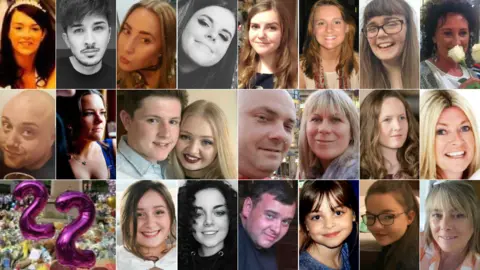Manchester attack: Council backs 'Martyn's Law' rules for venues
 Family handout
Family handoutManchester councillors have given their support to asking public venues to adopt stricter security measures which align with "Martyn's Law".
The proposed law is named after Martyn Hett, one of the 22 people killed in the 2017 Manchester Arena bombing.
His mother Figen Murray has campaigned for changes that would require public places and venues to improve security.
The government is still consulting on the law, but Manchester City Council wants to adopt some changes earlier.
The authority has sought feedback on plans to review the way in which it licenses venues and introduce new rules that share the same principles, the Local Democrary Reporting Service said.
However, without formal legislation, venues can only be asked to voluntarily comply.
The council has called for action amid concerns about when the government would formalise the legislation, with the process stalling during the coronavirus pandemic.
 Family handouts
Family handoutsSpeaking in a meeting on Monday, councillor Julie Reid said: "In that time somebody else's child could die.
"With the clubs reopening, this weekend is a prime time for somebody to do something dangerous.
"At the end of the day Martyn Hett would have been out in the Gay Village this weekend, and he can't."
New conditions proposed by the council would require venue staff to have counter-terrorism awareness and first aid training, while security staff would need to wear body-worn cameras.
CCTV systems would need to comply with police standards, with venues expected to create a security plan to routinely review security and risk assessments.
Everyone entering a venue would need to show verifiable identification, with owners expected to deploy an ID scanning system and random searches.
Storing footage from cameras and CCTV would need to be funded by the venue owners, the meeting heard.

Why not follow BBC North West on Facebook, Twitter and Instagram? You can also send story ideas to [email protected]
